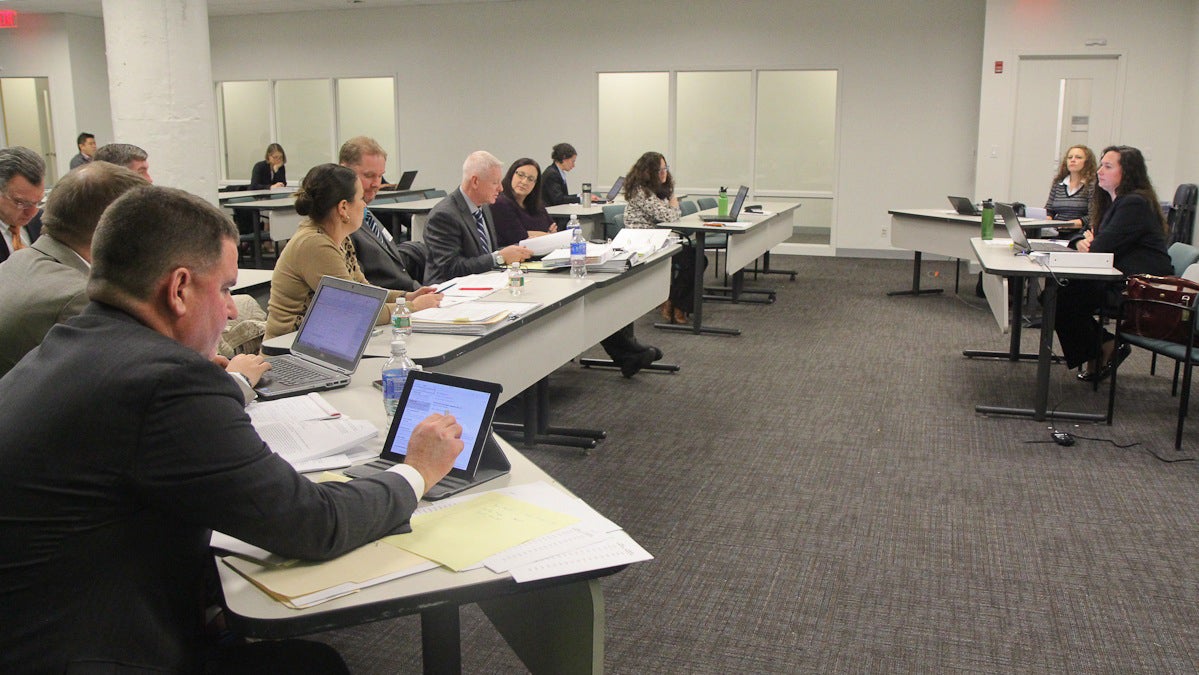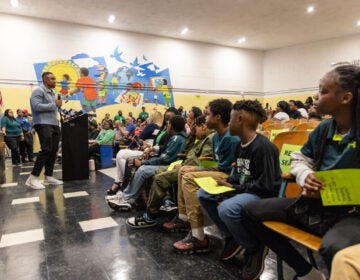2nd round of Philly charter application hearings probe demographics, bottom lines

New Foundations school makes a bid for a new charter at Philadelphia School District headquarters Monday. (Kimberly Paynter/WHYY)
In the wake of two charter schools closing last month in the middle of the school year, the Philadelphia School Reform Commission Monday entered into a second round of hearings on 40 proposed new charter schools.
While the first round consisted of 15-minute pitches by charter school applicants promising new buildings and better neighborhoods, these hearings are designed to dig into the weeds of the applications, to “obtain additional data” before making a decision, said Allison Peterson, a lawyer with the Levin Legal Group who is acting as the “hearing officer” on behalf of the School Reform Commission.
Megan Reamer, program officer from the district’s Charter School Office, relayed comments and answered questions. Neither SRC members nor senior leadership from the school district attended.
Each hearing consisted of comments on the applications by Reamer, on behalf of the district, followed by a question and answer period where Peterson asked district officials and applicants for more information on the applications “for clarity that the SRC needs.” Finally, applicants had up to 15 minutes for a closing presentation.
First up was an application by New Foundations Charter, which already operates a K-12 school in the Holmesburg area of Northeast Philadelphia. Seven representatives from New Foundations, led by CEO Paul Stadelburg, answered questions on their application for another K-12 school – this time in the Brewerytown neighborhood.
Reamer and Peterson questioned the proposed charter’s ability replicate its academic successes in a neighborhood with very different demographics than the Holmesburg school.
According to Reamer, New Foundations has served a population “historically less disadvantaged than an average district school,” with less than 1 percent of students falling into the English-language learner (ELL) category, for example.
Brewerytown has a higher proportion of low-income students and is predominantly black, whereas the existing New Foundations school is less than two-thirds low-income and 65 percent white. Stadelburg said the school would try to diversify its student body by drawing from other area ZIP codes, to include more white and ELL students.
The district has argued that it is unfair to use performance measures between neighborhood schools and charter schools because of significant differences in the level of high-needs students served.
The second presenter, Franklin Towne Middle School, also drew questions on demographics. The applicant already operates an elementary and high school in the same 19137 ZIP code as the proposed charter, and those schools are zero percent ELL with 10 or fewer percent special education students.
“Community outreach was the impetus for us putting this application in,” said Franklin Towne chief academic officer Paul Fields. A school lottery determined those demographic numbers, he said. In his closing statement, Fields said that creating a good school doesn’t mean having “magic pixie dust to sprinkle over the district,” but that Franklin Towne had a “succinct” track record of success.
Aside from demographic differences, questions and comments attempted to draw out more information on the relationship between proposed schools and any private companies they subcontract with for services such as accounting and facilities management. In 2010, New Foundations and Franklin Towne, along with 11 other schools, were investigated by city controller Alan Butkowitz for potential charter fraud.
The final school on the first day was Leon H. Sullivan Opportunities Charter School, which, like New Foundations, proposed to serve the 19121 ZIP code in Philadelphia. The school district has designated that area one where high-quality school options are lacking and thus potentially more favorable to charters serving that area.
In the background of these hearings is a cash-strapped school district that must hear new applications as a part of an amendment to the cigarette-tax law that passed last year.
That amendment, introduced by Rep. John Taylor, R-Philadelphia, requires the district to see new charter applicants on a yearly basis. Critics say charter growth disproportionately hurts public schools because the district absorbs additional costs when students leave public school for charter schools. Gov. Tom Corbett deleted a charter reimbursement line item that defrayed these “stranded costs” from the state budget in 2011.
By law, the SRC must rule on new charter applications in February.
Applicants have until Jan. 19 to respond to questions in the hearing by resubmitting pertinent information in their original applications. According to district spokesman Fernando Gallard, the SRC will base its decision on the application documents as well as a report by the hearing officer following this month’s meetings.
WHYY is your source for fact-based, in-depth journalism and information. As a nonprofit organization, we rely on financial support from readers like you. Please give today.




